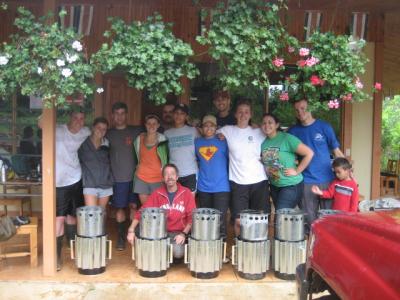Hi friends,
I have reported to many of you how fun and successful my cooking demonstration with Dr. Paul
Olivier's rusk husk burning TLUD was on my 1st day back in San Jose. My thanks again to friend and frequent SeaChar volunteer Birgit Lendernick for hosting and organizing that. So fun, great food, great conversations and the stove's clean blue flame impressed everyone there
It has been an absolutely exhilarating ten days, since my MEPE bus rolled into Puerto Viejo. Yesterday E.F. promoter, Thierry Mangel and I conducted a biochar buy-back day in the Bribri communities of Amubri, Suiri and Sueretka. We worked closely with the organizers in each community and although it involved lifting and transferring approx. 1200 lbs of biochar from homes to truck, to boat, back to truck and then off-loading. It went great, everyone coordinated well. After stopping at APPTA to pick up the last 10 sacks of biochar that we had inventoried there. We off-loaded and dry stored 565 kilograms in 54 sacks. This gives us enough to meet the order which we have received from a researcher at CORBANA. http://translate.google.com/translate?hl=en&sl=es&u=http://www.corbana.c...
CORBANA is the research and farmer education arm of the Costa Rican Banana industry. They have one of the most sophisticated soil testing laboratories in the country. They will be initiating a three year long controlled study program evaluating the use of biochar on banana cultivation and field practices. This will be the 1st of several orders as this program gets underway. We will enjoy full access to the data from the project as this very important relationship develops. As I have said recently I am not so impressed with how much more biochar we have been selling this year as I am by how influential some of the parties buying it are.








